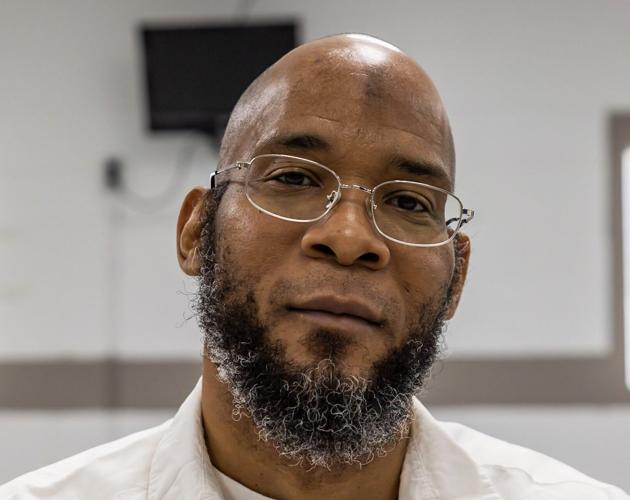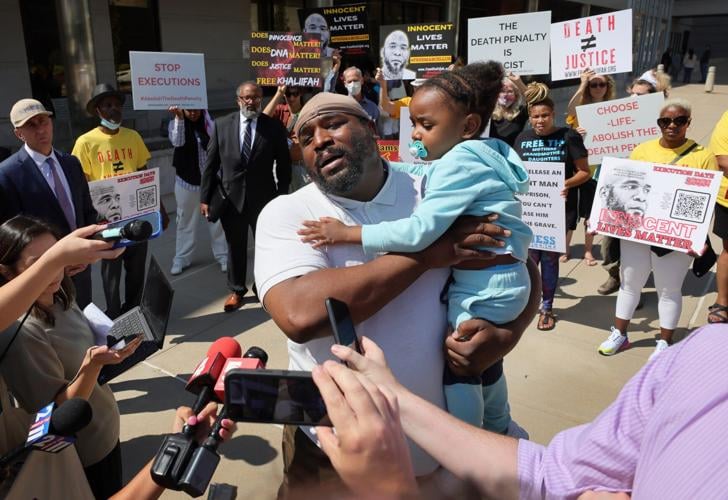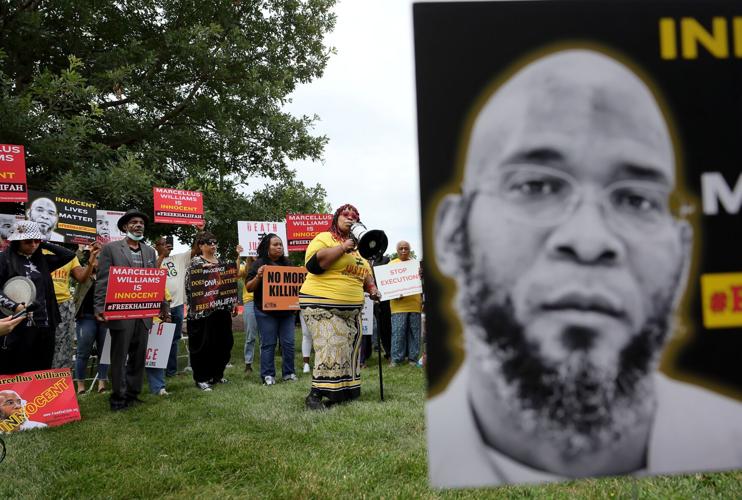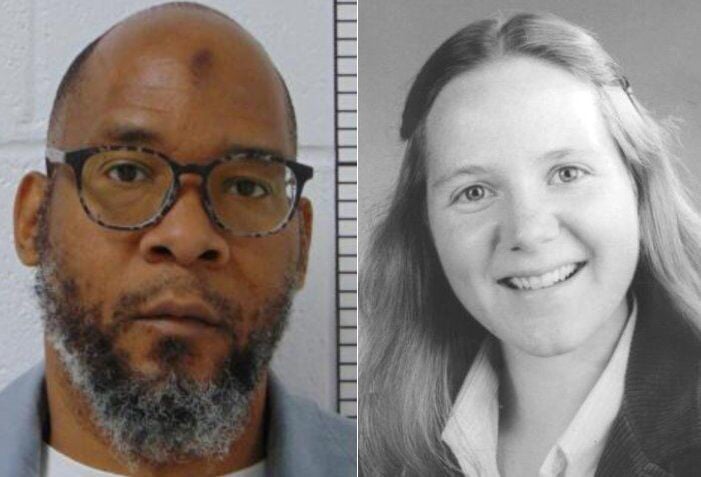ST. LOUIS COUNTY â A judge on Thursday upheld the murder conviction of Marcellus âKhaliifahâ Williams, quashing an effort to free him, and leaving his execution set to be held in almost two weeks.
UPDATE, Monday, Sept. 23:Â Missouri governor, state Supreme Court refuse to halt Marcellus Williams execution
St. Louis County Judge Bruce Hilton, who reviewed over 12,000 pages of evidence, said that Williamsâ claim of innocence âunraveledâ when an Aug. 19 DNA report was issued.
Williamsâ original argument was that his DNA was not found on the knife used to kill former Post-Dispatch reporter Felicia âLishaâ Gayle Picus, and that the DNA profiles that were found would lead authorities to the actual killer.
People are also reading…
But on Aug. 19, those DNA profiles were found to be consistent with the lead prosecutor and investigator on the case â the prosecutor, Keith Larner, in his testimony recalled handling the knife with his bare hands before trial.
Ed Magee, the caseâs investigator, told the Post-Dispatch he was not surprised his DNA was most likely on the knife because he also âhandled it numerous timesâ before trial.
â(Williamsâ) remaining evidence amounts to nothing more than re-packaged arguments about evidence that was available at trial and involved in Williamsâ unsuccessful direct appeal and post-conviction challenges,â Hilton wrote. â(Williams) has failed to demonstrate any basis for this court to find Williams actually innocent of first-degree murder.â
Williams has unsuccessfully appealed and challenged his conviction for more than two decades, ultimately taking the case to the Missouri Supreme Court.
Herman Jimerson, a Clayton attorney who has practiced criminal defense and personal injury law for 38 years, has followed the Williams case closely. He said he doesnât know if there are any additional legal avenues for Williams to avoid execution on Sept. 24 unless Gov. Mike Parson decides to pardon him.
âI think itâs a long shot,â Jimerson said. âI think itâs a sad shot.â
The St. Louis County circuit court judgeâs decision on Thursday morning came two weeks after he heard six hours of testimony rehashing evidence in Gayleâs brutal 1998 stabbing in a University City home in a gated neighborhood.
The August hearing focused on contamination of DNA on the murder weapon, potential racial bias in the jury selection and, in Williamsâ lawyerâs view, the unreliable witnesses on which much of his case hung.
Hilton in his ruling said Williamsâ lawyers failed in arguing that evidence was destroyed by prosecutors âin bad faith,â a component that must be proved to establish legal merit. He also said the witnesses provided information to the police that was not known publicly, supporting their credibility.
Missouri Attorney General Andrew Bailey has fought the exoneration effort at every step. He argued that Williams was actually guilty of the crime and that Hilton did not have legal authority to vacate the conviction because the case had been appealed to higher courts.
Hilton, in his ruling, disagreed and presented several arguments as to why he did have jurisdiction to rule on the conviction and not the execution itself.
Bailey did not immediately comment on the ruling Thursday.
St. Louis County Prosecuting Attorney Wesley Bell released a statement Thursday afternoon, saying he was âimmensely disappointedâ by it and would âcontinue to work to preventâ Williamsâ execution. He did not state how he planned to do that. Bellâs conviction and incident review unit believes the evidence shows that Williams is innocent.
â(F)or something as consequential as the death penalty, the evidence must prove the defendant to be guilty without a shadow of a doubt,â Bell said. âThere are detailed and well-documented concerns regarding the integrity of Mr. Williamsâ conviction.â
Williams and his defense team have maintained his innocence, and have repeatedly pointed out that no physical evidence connects him to the crime other than a stolen laptop he sold to a neighbor.
Williams is represented by private counsel, as well as lawyers from the Midwest Innocence Project.
âThe decision of a prosecutor to move to vacate a murder conviction and death sentence is not done lightly,â said Tricia Rojo Bushnell, one of those attorneys. âProsecuting Attorney Bell filed a motion because there is overwhelming evidence that Marcellus Williamsâ trial was constitutionally unfair, including revelations that the state contaminated the most critical evidence in the case â the murder weapon.â
Bushnell is also the executive director of the Midwest Innocence Project and said they will continue to pursue every possible option to prevent the execution. She also said there is still time for the courts or Parson to act.
Missourians To Abolish The Death Penalty co-director Michelle Smith, who says sheâs a close friend of Williams, stood outside the St. Louis County courthouse on Thursday. She told reporters she hadnât talked to Williams since Aug. 28 after the evidence hearing, and said Thursdayâs decision is a âdevastating blow to justice and yet another stain on Missouriâs conscience.â
She emphasized that she and others still believe Williams is innocent, and said her organization plans to continue advocating for Williams, urging Parson to intervene while also mobilizing the community to speak out against the execution.
âWe will not stop fighting until we dismantle this murderous system and ensure no more lives are lost to this brutality,â she said, calling execution âstate-sanctioned murder.â
The NAACP also spoke out, saying it was âdeeply disturbedâ by Hiltonâs ruling. Nimrod Chapel, president of the Missouri NAACP, wrote in a statement that Williamsâ innocence is âsupported by significant evidence.â
âThis is not about justice, but about a broken and inhumane system that disproportionately targets Blacks and marginalized people,â he said.
Williams, who is Black, stood trial for 14 days and was convicted by a jury of first-degree murder three years after Gayleâs husband came home and found she had been stabbed more than 40 times. His DNA has not been linked to the crime scene.
The jury, consisting of 11 white jurors and one Black juror, then deliberated for 90 minutes before deciding to sentence him to death.
Lawyers in court have said Gayleâs family does not support the death penalty, but Laura Friedman said in a letter to the Post-Dispatch that they do believe heâs guilty. Friedman is now married to Gayleâs husband, Dr. Daniel Picus, who declined to talk to the media after the Aug. 28 evidence hearing.
âIâm glad Judge Hilton ruled on this matter,â said Magee, the original caseâs investigator, on Thursday. âAnd that he clearly stated that no evidence of actual innocence was presented at the hearing.â
As of Wednesday, Williams was still set to die by lethal injection next week for the 1998 murder of former Post-Dispatch reporter Felicia âLishaâ Gayle in 1998.
Nimrod Chapel, president of Missouri NAACP, speaks to reporters outside the courthouse in Clayton about a deal prosecutors reached with Marcellus âKhaliifahâ Williams that changes Williams death sentence to life in prison without the possibility of parole on Wednesday, Aug. 21, 2024. The change in sentencing came about five weeks before Williams' scheduled execution date for the murder of Lisha Gayle, who was stabbed 43 times in her suburban home in August 1998. He was convicted of the killing in a 2001 trial.

















